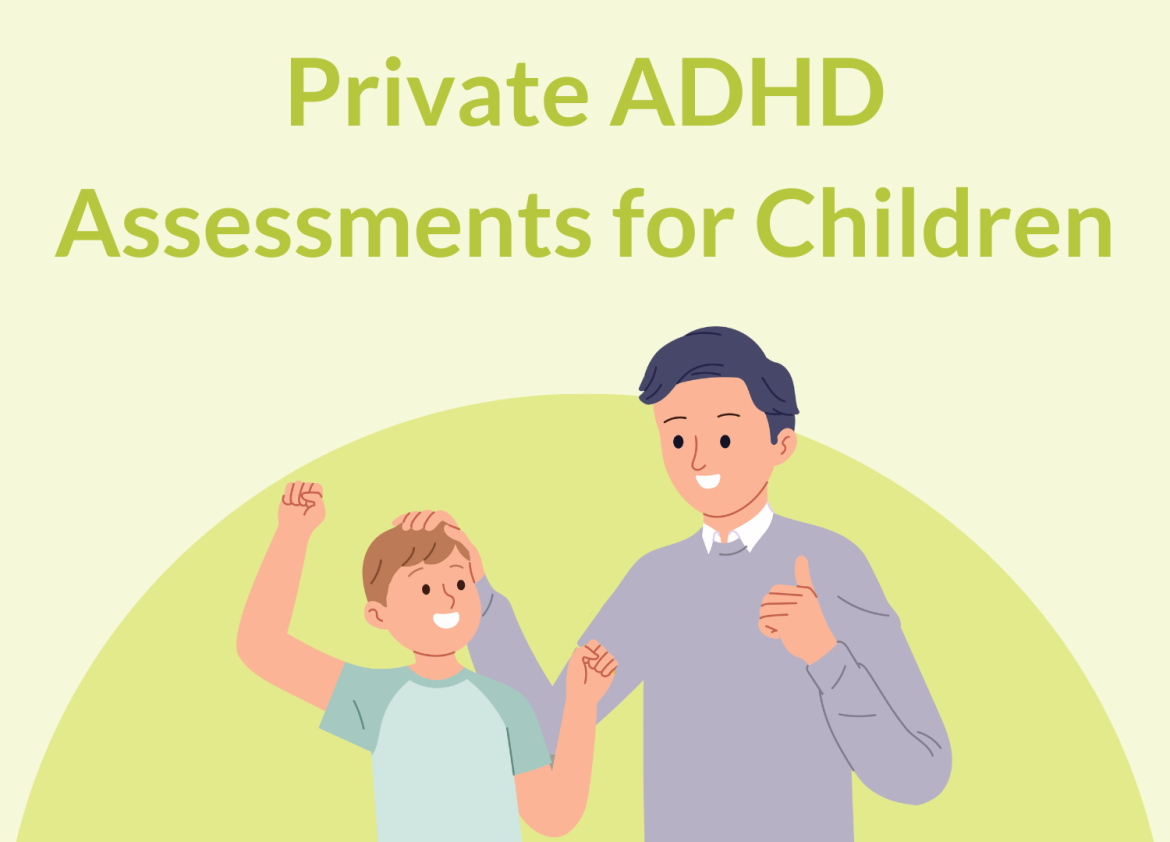

A diagnosis of ADHD should only be made by a specialist psychiatrist, paediatrician or other qualified health professional with training and expertise in the diagnosis of ADHD.
For children younger than six, we advise seeking a referral to community paediatrics through your General Practitioner. Our service does not provide assessments and treatments for this age group.
Why Choose Us?
We recognise that a young person’s needs can be overlooked, especially as some children attempt to ‘mask’ their difficulties. To ensure every child receives a thorough and sensitive evaluation, we have developed a careful, ‘staged’ assessment approach. These NICE-compliant assessments are delivered by our expert team, which includes highly qualified Consultant Child and Adolescent Psychiatrists, a Paediatrician, Psychologists, and specialist Nurse Practitioners.
Our NICE-Compliant Approach to ADHD Diagnosis
Help for Psychology works with many highly qualified and experienced Consultant Child and Adolescent Psychiatrists, a Paediatrician, Psychologists and specialist Nurse Practitioners, who can offer NICE-compliant assessments for ADHD.
The NICE guidelines recommend that assessment only takes place after the following:
- There has been a period of ‘watchful waiting’ of up to ten weeks
- The behaviour/attention problems are causing moderate to severe impairment.
The NICE guidelines recommend that a diagnosis of ADHD should not be based solely on standardised questionnaires such as the Conners 4. We do, however, use the Conners 4, which is completed by both parents and someone who has observed the child in a different setting (usually school), to support our assessment process.
Our clinicians, like those working within NHS clinical settings, follow the DSM-5 or ICD-11 criteria for diagnosis, which stipulate that the difficulties reported for the child or young person must:
- Cause at least moderate psychological, social and/or educational impairment
- Be observed either during a clinical appointment and/or direct observation in multiple settings.
We understand that some young children (particularly girls) may attempt to ‘mask’ their difficulties in school, and those with attention deficit disorder may be harder to identify in the school setting. We do not want a young person’s needs to be overlooked because their presentation is too subtle for a screening tool.
However, we are aware that unless the difficulties are observed across multiple contexts or the child is out of school and a school report/observation is not possible, it can be difficult to get a diagnosis accepted by an NHS team that follows the DSM/ICD criteria without exceptions.
Therefore, we have developed a staged process for our child ADHD assessments.
What Does a Child ADHD Assessment Involve?
Stage 1 – Initial Screening
Stage one of our assessment begins with the industry-standard Conners 4 assessment. We ask that parents and a third party (a professional who knows the child, or the child’s school) complete the Conner’s screen. If both the parent and third parties confirm the presence of ADHD symptoms, we would then recommend a full ADHD assessment to confirm a diagnosis, and to discuss possible strategies for support (these might be a discussion about a course of CBT or executive function coaching, or a combination of all three).
Stage 2 – Clinic Observation and Qb Check
If the young person has high anxiety levels or other mental health challenges, we would recommend booking a further consultation appointment with one of our clinicians
Following the consultation, the psychiatrist will recommend whether a comprehensive assessment is advisable, which can then be scheduled.
Stage 1 – Screening
Stage one of our assessment begins with the industry-standard Conners 4 assessment. We ask that parents and a third party (a professional who knows the child, or the child’s school) complete the Conner’s screen. If both the parent and third parties confirm the presence of ADHD symptoms, we would then recommend a full ADHD assessment to confirm a diagnosis, and to discuss possible strategies for support (these might be a discussion about medication, a course of CBT or executive function coaching, or a combination of all three).
Stage 2 – Consultation
In the event that the Conner’s screening is inconclusive, we strongly recommend that the child be seen in our clinic prior to booking a full assessment. During this consultation, we will carry out an observation and complete a Qb check. The Qb check is an objective, computer-based measure for evaluating a child’s or young person’s attention and activity levels. If this and the observation are suggestive of ADHD, we would then recommend progressing to a full diagnostic assessment.
If the young person has high anxiety levels or other mental health challenges, we would recommend booking a further consultation appointment with one of our clinicians
Following the consultation, the psychiatrist will recommend whether a comprehensive assessment is advisable, which can then be scheduled.
What to Expect During the Assessment
Please note that we can only offer face-to-face appointments with one of our Psychiatrists at our Norwich clinic currently, and with our Paediatrician in our Henley-in-Arden clinic.
Our process is as follows:
- Parents and school (or alternative third party) complete the Conners 4 screen for ADHD.
- One of our clinicians meets with the child’s parents or carers to take a full developmental, medical and psychosocial history of the child. As the lead clinician, he or she will also spend some time with the child, in person or online. Please note that the clinician will need to ask questions about the mental health of the child’s parents and their family situation as part of the interview. Wherever possible, we also like to include the views of the child or young person.
- The child attends one of our clinics to complete a WISC-V cognitive Assessment
- If this has not already been completed as part of a pre-assessment consultation, the child also completes a Qb check during this appointment. (The Qb check is a standardised, computer-based task that measures a child’s ability to concentrate, as well as their movement and impulsivity.)
- The clinician completing the Qb check will then spend some time with the child completing a self-report questionnaire.
- The evidence from all the assessments is considered, and a diagnosis (if appropriate) is fed back to the family
- A full report with recommendations is issued
Our comprehensive report provides you with a clear and actionable private ADHD diagnosis, recognised by schools and other professionals across the UK.
Support and Interventions Following an ADHD Diagnosis
Following the assessment, we can explore the various support options and interventions that are available.
These include CBT approaches for:
- Social skills
- Problem-solving
- Active listening skills
- Managing feelings and emotions
Our ADHD Assessment Pricing
Conners 4 Assessment
NICE Compliant ADHD Assessment
Price - £195
Price - £1,800
- A "Confirm First" Approach Saves You Time & Money
- Provides a 360-Degree View of Your Child
- A Clear Pathway to Practical Support Strategies
- A Diagnosis from a Highly Qualified Multidisciplinary Team
- A Nationally Recognised, NICE-Compliant Assessment
- A Unique 'Staged' Approach for a More Sensitive Evaluation
- A Comprehensive Assessment Using Multiple Evidence Sources
- A Full, Actionable Report with Clear Recommendations
- An Integrated Pathway to Post-Diagnosis Support
Conners 4 Assessment
Price - £195
- A "Confirm First" Approach Saves You Time & Money
- Provides a 360-Degree View of Your Child
- A Clear Pathway to Practical Support Strategies
NICE Compliant ADHD Assessment
Price - £1,800
- A Diagnosis from a Highly Qualified Multidisciplinary Team
- A Nationally Recognised, NICE-Compliant Assessment
- A Unique 'Staged' Approach for a More Sensitive Evaluation
- A Comprehensive Assessment Using Multiple Evidence Sources
- A Full, Actionable Report with Clear Recommendations
- An Integrated Pathway to Post-Diagnosis Support
Frequently Asked Questions
The Conners 4 is a comprehensive questionnaire used by clinicians as a key part of the ADHD assessment process. It is a highly respected and widely used tool that helps gather detailed information about a child's behaviour and symptoms from the key people in their lives – typically parents and teachers.
The assessment asks questions about core ADHD symptoms like inattention and hyperactivity, as well as related areas such as executive functioning, learning problems, and social behaviours.
As a screening tool, the Conners 4 provides our clinical team with structured data to help build a complete and accurate picture of your child's challenges. This information is a vital first step in our NICE-compliant diagnostic process.
Still have questions about ADHD assessments?
Monday–Friday, 9:00–17:00
Still have questions about ADHD assessments?
Monday–Friday, 9:00–17:00
Contact us to start the NICE-compliant assessment process, led by our supportive and experienced clinical team.
Contact us to start the NICE-compliant assessment process, led by our supportive and experienced clinical team.

